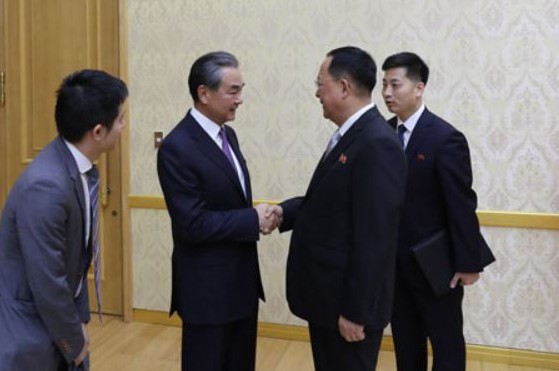China, North Korea vow close consultation on Korean Peninsula issues
By Park Han-naPublished : Sept. 3, 2019 - 16:13
The foreign ministers of North Korea and China agreed to consult closely on Korean Peninsula issues during a bilateral meeting in Pyongyang, amid stalled denuclearization talks with the US.
Chinese State Councilor and Minister of Foreign Affairs Wang Yi met with North Korean Foreign Minister Ri Yong-ho following his arrival in Pyongyang on Monday for a three-day visit.
Chinese State Councilor and Minister of Foreign Affairs Wang Yi met with North Korean Foreign Minister Ri Yong-ho following his arrival in Pyongyang on Monday for a three-day visit.

Marking the 70th anniversary of the establishment of diplomatic relations between China and North Korea, Wang and Ri said the allies have opened a new era of relations with strengthened ties and cooperation.
Wang was quoted as saying that Beijing and Pyongyang have been in the same boat since the forging of their ties, regardless of the changes in the international environment.
During the meeting at Mansudae Assembly Hall in Pyongyang, Ri briefed Wang on the current situation surrounding the Korean Peninsula, while Wang shared updates on China’s stance and measures regarding Hong Kong’s anti-government protests.
The massive protests in Hong Kong were sparked by a proposed change to the law that would allow extradition to China but they have since expanded to demands for greater democracy.
China’s state-run media outlets have accused the US and other Western countries of orchestrating the turmoil.
The North Korean minister expressed support for China, reaffirming that Hong Kong belongs to China and external forces should not intervene.
Ri touted the close relations between Chinese President Xi Jinping, who visited the North in June, and North Korean leader Kim Jong-un, who has traveled to China four times.
Speculation is growing that Wang’s trip is aimed at discussing the North Korean leader’s visit to Beijing.
Washington and Pyongyang have yet to meet for working-level dialogue on denuclearization of the Korean Peninsula. On the other hand, Beijing and Pyongyang have engaged in high-level exchanges in a wide-range of fields including politics, the economy, the military and culture.
On Aug. 16, Kim Su-gil, who serves as director of the General Political Bureau of the Korean People’s Army, visited Beijing to meet with his counterpart, Zhang Youxia.
A week later, North Korea’s Minister for External Economic Affairs Kim Yong-jae made remarks at a forum in Changchun, the capital of China’s Jilin province.
During the fifth summit between Xi and Kim Jong-un in June, the two leaders agreed to “maintain the tradition of high-level exchanges” and “deepen exchanges and cooperation in each field.”
The North Korean leader has often played the US and China off each other to increase his leverage, especially prior to denuclearization talks.
North Korea has ramped up its rhetoric against the US while launching several short-range missiles and other new weapons. It has also expressed discomfort over the impasse on sanctions relief from Washington.
On Saturday, North Korean First Vice Foreign Minister Choe Son-hui said Pyongyang’s hopes for nuclear talks with Washington were fading, pointing to US Secretary of State Mike Pompeo’s recent comments depicting the country’s rocket launches as “rogue.”
The North Korean leader and US President Donald Trump met in June at the inter-Korean border and vowed to reopen working-level negotiations in weeks, but Pyongyang has been tepid in its response.
To facilitate the resumption of talks between the US and North Korea, South Korea’s top nuclear negotiator, Lee Do-hoon, met his Russian counterpart, Igor Morgulov, Tuesday.
The two diplomats agreed on the need for the prompt resumption of talks and for joint efforts to achieve the complete denuclearization of the peninsula and establish lasting peace.
(hnpark@heraldcorp.com)










![[Today’s K-pop] BTS pop-up event to come to Seoul](http://res.heraldm.com/phpwas/restmb_idxmake.php?idx=644&simg=/content/image/2024/04/17/20240417050734_0.jpg&u=)
![[Graphic News] More Koreans say they plan long-distance trips this year](http://res.heraldm.com/phpwas/restmb_idxmake.php?idx=644&simg=/content/image/2024/04/17/20240417050828_0.gif&u=)





![[KH Explains] Hyundai's full hybrid edge to pay off amid slow transition to pure EVs](http://res.heraldm.com/phpwas/restmb_idxmake.php?idx=652&simg=/content/image/2024/04/18/20240418050645_0.jpg&u=20240419100350)

